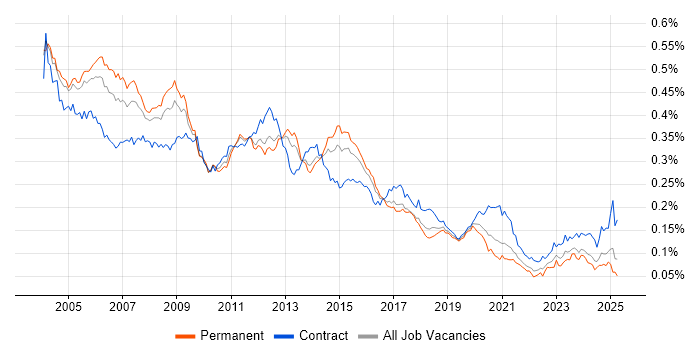Oracle Analyst
UK > England
The median Oracle Analyst salary in England is £57,500 per year, according to job vacancies posted during the 6 months leading to 5 May 2025.
The table below provides salary benchmarking and summary statistics, comparing them to the same period in the previous two years.
| 6 months to 5 May 2025 |
Same period 2024 | Same period 2023 | |
|---|---|---|---|
| Rank | 629 | 765 | 873 |
| Rank change year-on-year | +136 | +108 | +213 |
| Permanent jobs requiring an Oracle Analyst | 29 | 79 | 75 |
| As % of all permanent jobs advertised in England | 0.062% | 0.093% | 0.081% |
| As % of the Job Titles category | 0.069% | 0.098% | 0.089% |
| Number of salaries quoted | 19 | 56 | 64 |
| 10th Percentile | - | £43,500 | £37,500 |
| 25th Percentile | £51,250 | £48,000 | £42,438 |
| Median annual salary (50th Percentile) | £57,500 | £55,000 | £50,000 |
| Median % change year-on-year | +4.55% | +10.00% | -9.09% |
| 75th Percentile | £60,625 | £75,000 | £57,500 |
| 90th Percentile | £61,250 | £83,750 | £76,875 |
| UK median annual salary | £57,500 | £55,000 | £50,000 |
| % change year-on-year | +4.55% | +10.00% | -9.09% |
All Permanent IT Job Vacancies
England
For comparison with the information above, the following table provides summary statistics for all permanent IT job vacancies in England. Most job vacancies include a discernible job title that can be normalized. As such, the figures in the second row provide an indication of the number of permanent jobs in our overall sample.
| Permanent vacancies in England with a recognized job title | 42,114 | 80,514 | 84,327 |
| % of permanent jobs with a recognized job title | 90.37% | 94.48% | 91.53% |
| Number of salaries quoted | 24,536 | 60,209 | 53,453 |
| 10th Percentile | £30,000 | £28,500 | £32,500 |
| 25th Percentile | £42,464 | £38,125 | £45,000 |
| Median annual salary (50th Percentile) | £57,500 | £53,500 | £60,800 |
| Median % change year-on-year | +7.48% | -12.01% | +1.33% |
| 75th Percentile | £75,000 | £71,915 | £82,500 |
| 90th Percentile | £97,500 | £90,822 | £100,000 |
| UK median annual salary | £57,500 | £52,500 | £60,000 |
| % change year-on-year | +9.52% | -12.50% | - |
Oracle Analyst
Job Vacancy Trend in England
Job postings that featured Oracle Analyst in the job title as a proportion of all IT jobs advertised in England.

Oracle Analyst
Salary Trend in England
3-month moving average salary quoted in jobs citing Oracle Analyst in England.
Oracle Analyst
Salary Histogram in England
Salary distribution for jobs citing Oracle Analyst in England over the 6 months to 5 May 2025.
Oracle Analyst
Job Locations in England
The table below looks at the demand and provides a guide to the median salaries quoted in IT jobs citing Oracle Analyst within the England region over the 6 months to 5 May 2025. The 'Rank Change' column provides an indication of the change in demand within each location based on the same 6 month period last year.
| Location | Rank Change on Same Period Last Year |
Matching Permanent IT Job Ads |
Median Salary Past 6 Months |
Median Salary % Change on Same Period Last Year |
Live Jobs |
|---|---|---|---|---|---|
| South East | +89 | 9 | £60,000 | +14.29% | 5 |
| London | +85 | 7 | £65,000 | -9.72% | 9 |
| Midlands | +65 | 6 | £52,500 | +3.96% | 1 |
| North of England | +58 | 6 | £52,500 | - | |
| North West | +8 | 6 | £52,500 | - | |
| West Midlands | +60 | 4 | £52,500 | - | 1 |
| East Midlands | +45 | 2 | £57,500 | +13.86% | |
| East of England | +44 | 1 | £57,500 | +12.75% | |
| Oracle Analyst UK |
|||||
Oracle Analyst Skill Set
Top 30 Co-occurring Skills and Capabilities in England
For the 6 months to 5 May 2025, Oracle Analyst job roles required the following skills and capabilities in order of popularity. The figures indicate the absolute number co-occurrences and as a proportion of all permanent job ads across the England region featuring Oracle Analyst in the job title.
|
|
Oracle Analyst Skill Set
Co-occurring Skills and Capabilities in England by Category
The follow tables expand on the table above by listing co-occurrences grouped by category. The same employment type, locality and period is covered with up to 20 co-occurrences shown in each of the following categories:
